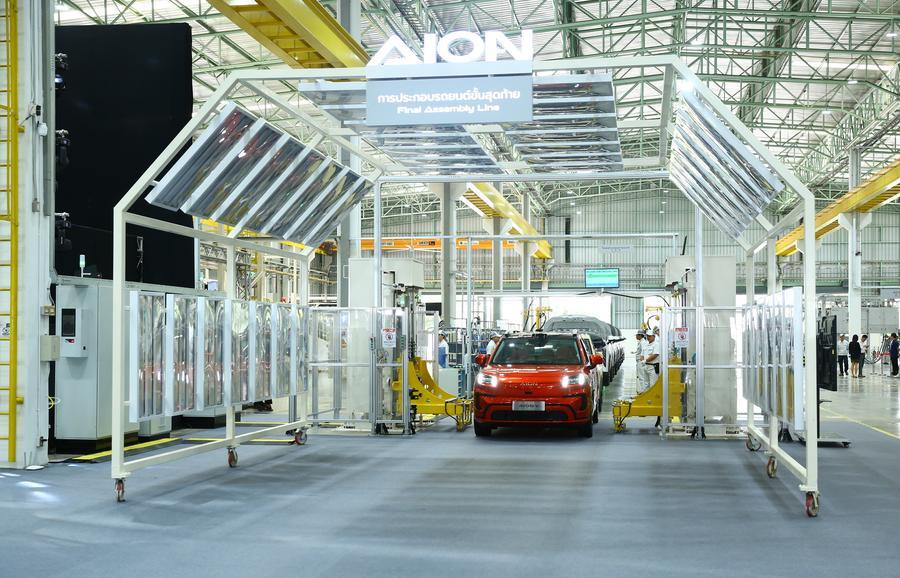This photo taken on July 17, 2024 shows the first global strategic model of China's carmaker GAC Aion at Aion's electric vehicle (EV) factory in Rayong province, Thailand. (Xinhua/Sun Weitong)
A Thai auto industry expert has highlighted China's world-class expertise in EV technology, particularly in battery systems and industrial-scale manufacturing, which is complemented by Thailand's geographic advantages, skilled labor, and robust government support.
BANGKOK, July 20 (Xinhua) -- The growing presence of Chinese automakers in Thailand has marked a crucial milestone in collaborative efforts toward green mobility and deepening of ties with China, a Thai auto industry expert has said.
Suroj Sangsnit, president of the Electric Vehicle Association of Thailand (EVAT), described the partnership as a testament to the systematic development of electric vehicle ecosystem and a strategic step toward advancing shared environmental goals.
In a recent interview with Xinhua, Suroj highlighted China's world-class expertise in EV technology, particularly in battery systems and industrial-scale manufacturing, which is complemented by Thailand's geographic advantages, skilled labor, and robust government support.
This synergy, he said, enables both countries to collaborate across the entire EV value chain, from vehicle production and infrastructure development to battery recycling.
Staff members work at the electric vehicle (EV) factory of China's carmaker GAC Aion in Rayong province, Thailand on July 17, 2024. (Xinhua/Sun Weitong)
The arrival of Chinese manufacturers, offering "advanced technology, accessible prices, and swift product deployment," has made EVs more attainable for the average Thai consumer, fostering wider adoption, he said.
That has also spurred investment in infrastructure such as charging stations, battery repair services, EV maintenance education, and parts manufacturing, he noted.
In the first half of 2025, new registrations of pure electric passenger vehicles in Thailand increased nearly 35 percent over the same period last year, reaching 55,708 units, of which Chinese brands accounted for almost 90 percent, official data showed.
Over the past few years, several Chinese automakers have established production facilities in Thailand, significantly bolstering the Southeast Asian country's ambition to become a regional electric mobility hub.
Suroj underscored the EVAT's role in fostering regional integration within the Association of Southeast Asian Nations by creating a network with its counterparts. He noted that the goal is to develop common standards and enable cross-border infrastructure, such as charging roaming.
Suroj emphasized that EV cooperation will be a cornerstone of future cooperation. He envisioned collaborative efforts in technologies, including solid-state batteries, intelligent EV platforms, and battery recycling solutions, with the establishment of joint research and development centers in Thailand.




 A single purchase
A single purchase









